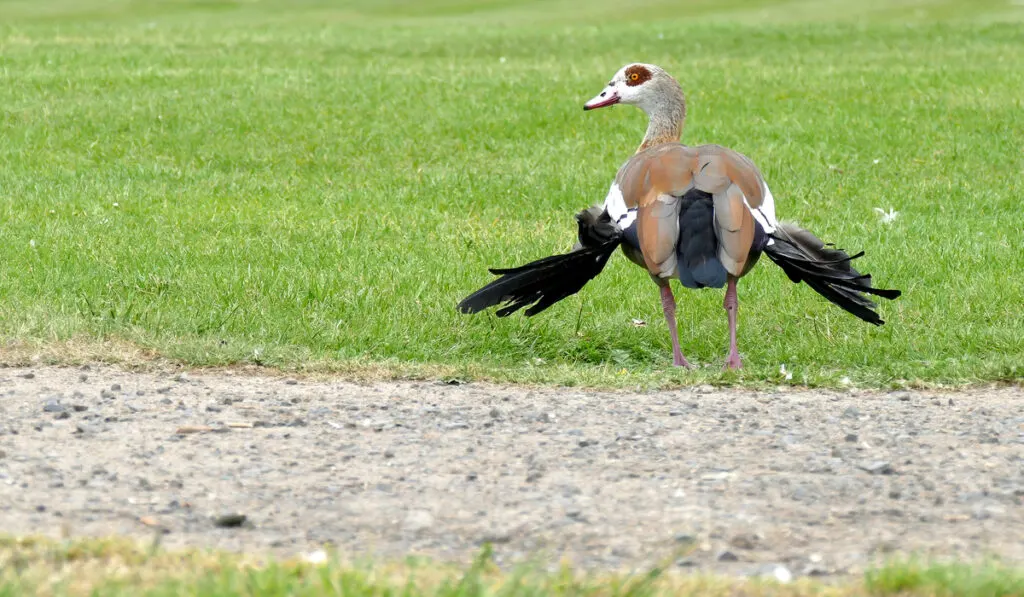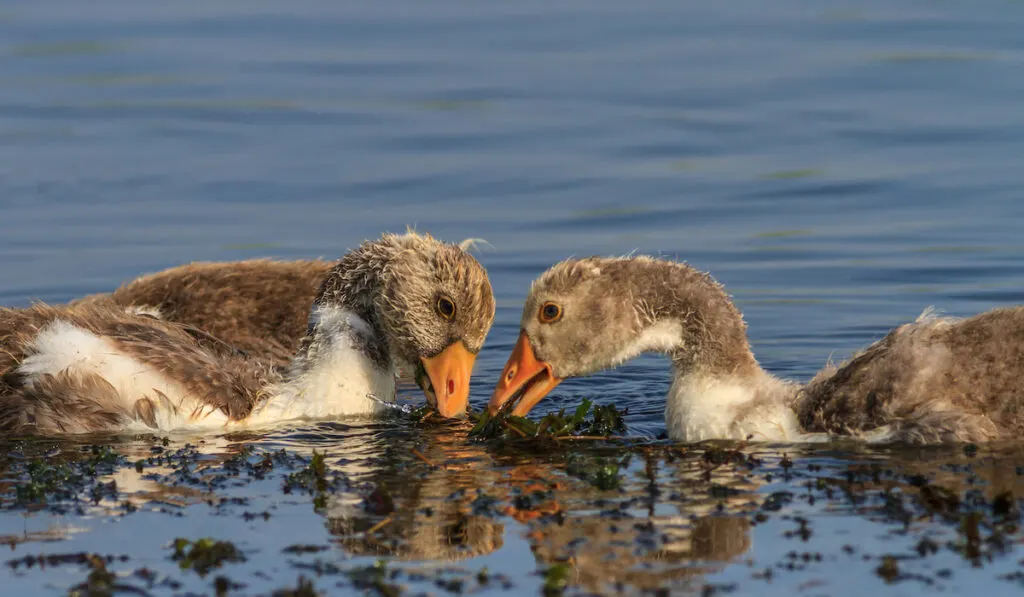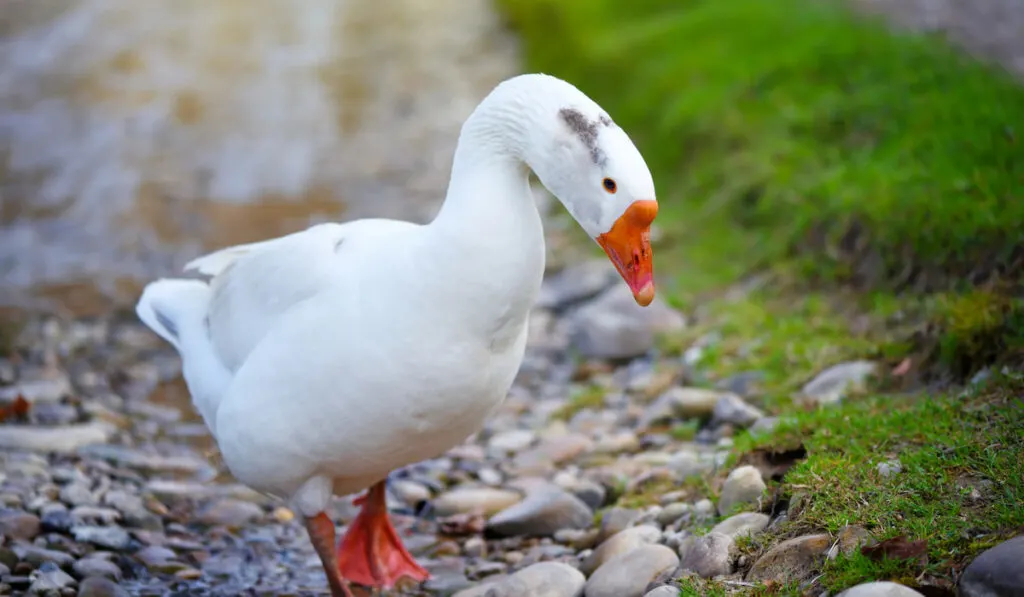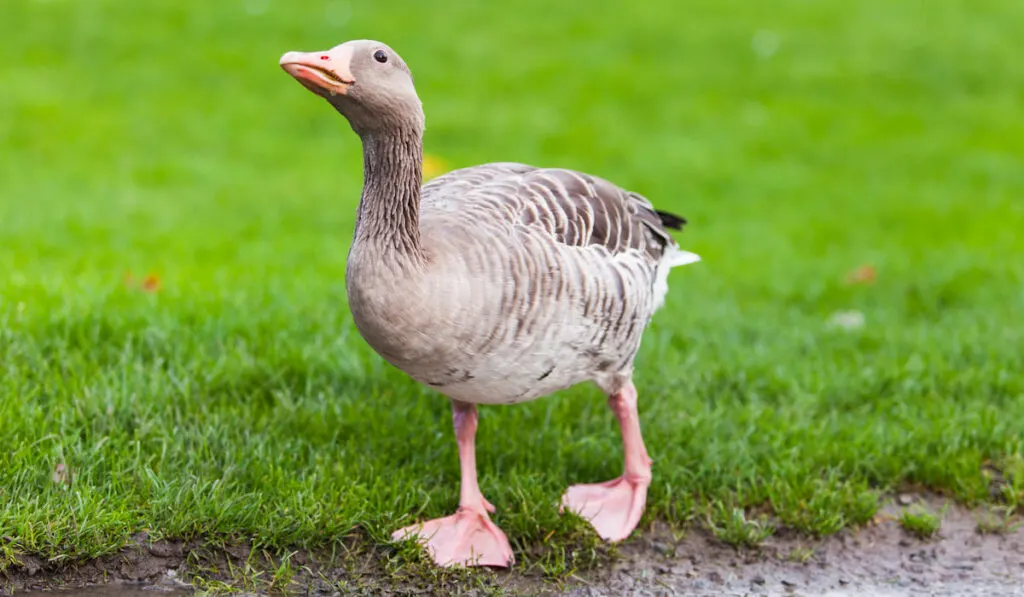Geese aren’t known as being very expressive animals. They’ll let you know when they’re upset, but what about if they are sick or injured? They’re not like dogs that will come to you whimpering in pain.
A lot of people confuse sick or hurt geese with angry or aggressive geese. They generally have a limited range of emotions they can express.
So how can you tell if your goose is sick? If you’re new to raising geese, this can be quite the challenge. Usually, spotting an injury or illness in your flock takes time spent watching them.
You learn their natural behaviors, preferences, etc., so you can easily spot when something goes wrong.
Thankfully, experienced goose owners are eager to share telltale signs to help you know when your goose may be sick. We’ve put nine of them here as well as what you can do to help nurse your goose back to health or when you need to get help from a vet.
Table of Contents
The 9 Signs Your Goose Is Sick
Here are nine signs your goose may be sick and what you can do to help.

1. There Is an Obvious Injury
Animals get hurt sometimes. You can’t overreact every time a goose sprains an ankle or gets a nick on its beak. These guys live outside day and night, and they’re known to be territorial animals. Geese get in fights with each other and plenty of other animals.
How can you tell if an injury is making them sick? You need to monitor their energy levels and watch for infection. If your goose is not moving when they are normally very active, or you can see redness or swelling around an injury, then you could have a more serious injury on your hands.
2. They Have Trouble Staying Balanced
Watch to see if your goose is having a hard time walking or staying firm on its feet. Sick geese often have internal balance problems, and the signs of illness will be obvious when they are walking around.
If you see your goose stumbling or tripping as they walk in a field or moving in and out of your pen, they may have a fever or some other type of sickness.
3. Diarrhea
Diarrhea is a sure sign that your goose is sick. A bit of digestive trouble is usually normal every once in a while. The problem with animal diarrhea is that they can quickly become dehydrated and die.
If you see a lot of diarrhea around the goose pen or you see droppings dirtying up their tail feathers, you should monitor them closely and do what you can to get them to drink more water. A vet will give you some antibiotics or some other medicine to stop diarrhea so they can retain more water in their system.
4. They Have Worms
Geese do their best to stay clean, but sometimes they can’t help it. When they are swimming around in still water or walking in the mud after it rains, it’s easy for them to catch parasites. They frequently have worms that you can see in their droppings.
Pinworms and other small parasites rob your geese of nutrients in their diets. They will need to take medication to get rid of the parasites.

5. Shaking Their Head Frequently
Is your goose shaking their head all of the time? Does it look like they are trying to shake something off of their neck? This is one of the telltale signs that your goose is sick. When geese aren’t feeling well, they typically shake their heads to sort of shake the cobwebs free.
It’s one of their ways to try and get rid of a sick feeling because they don’t quite know what else they should do. A bit of head shaking is no issue, but if they are doing it frequently, you may want to get them checked out.
6. They Aren’t Moving
Geese like to sit around a lot. They’ll hide from the sun during hot times of the day, and usually will make an appearance for food when they’re hungry.
Depending on how long you’ve owned your goose, you should be able to tell when they are being more lethargic than usual. If they don’t feel like moving even when you try to coax them out with treats, then something could be wrong and they need a closer look.
7. Their Joints Are Swollen
Geese are notorious for having foot and joint problems. You’ll need to keep their pen clean, ensure access to fresh water, and inspect your animals frequently to get in front of any joint problems that can lead to more serious illnesses.
Swollen and red joints are a good indicator your goose is dealing with some sort of sickness. If you don’t know what the cause is, you should probably get them to the vet sooner rather than later.

8. They Are Limping
Limping geese need some help. It takes a lot for a goose to limp or show other outward signs that they are injured or sick.
If you spot one of your geese limping, they could be sick internally to the point it’s affecting the way they walk, or they could be dealing with an injury that’s affecting their movement.
9. They Won’t Eat
If your goose won’t eat what they should be eating, they could be sick. And, if a goose refuses to eat for days, then it could be very sick.
Keeping track of how much each goose is eating can be hard when you have a lot of birds in your flock, but try to spot when a goose avoids food or doesn’t show interest during feeding time. If it’s a recurring issue, then they are likely sick and will need some type of intervention.

What to Do When Your Goose Is Sick
Having a sick goose can be stressful. One of the hardest parts of having sick geese is that you can’t exactly tell how long they’ve been sick.
A lot of goose owners generally let their birds roam and wander. They make sure they have what they need, but it’s not like you’re spending all day with your geese. That said, here’s what you should do if you are worried your goose is having some trouble.
Isolate them – You may want to isolate your goose to make sure they stay safe and have the space they need to recover. Also, you don’t want them to get any other geese sick!
Get them food and water – Make sure your goose always has access to clean water and food. Geese with diarrhea can get their droppings in water and food bowls, and it can make them sicker.
Clean the pen – Cleaning up after a sick goose can be tough and unpleasant, but it’s so necessary. Keep them clean so they aren’t living in poor conditions.
Go to the vet – You need to take your goose to the vet if symptoms persist or things take a turn for the worst. You may be able to get by with a short phone call where you explain what’s happening and get some tips on what to do.
In the end, nothing beats spending time with your goose. Stay on top of their condition so you can spot when something’s wrong before there are any serious issues.
